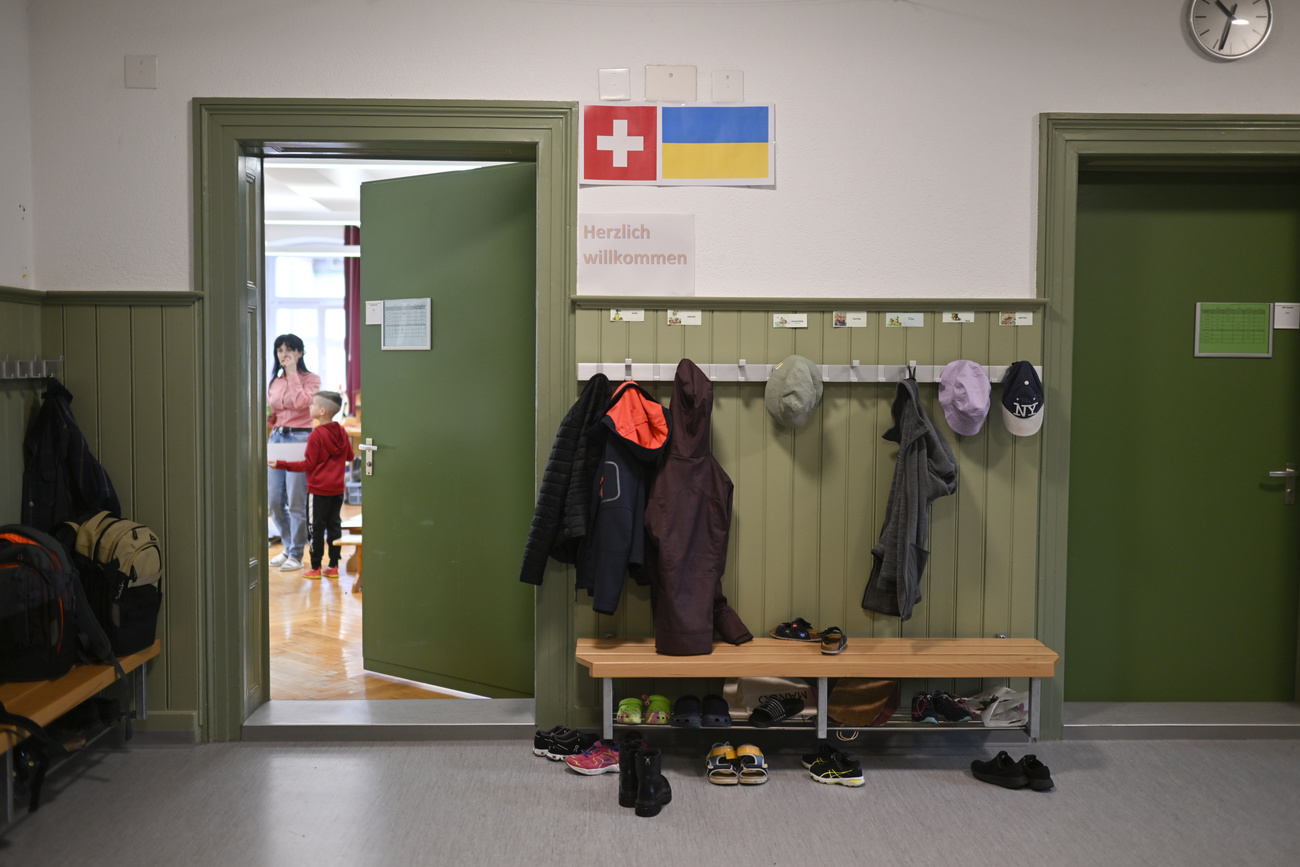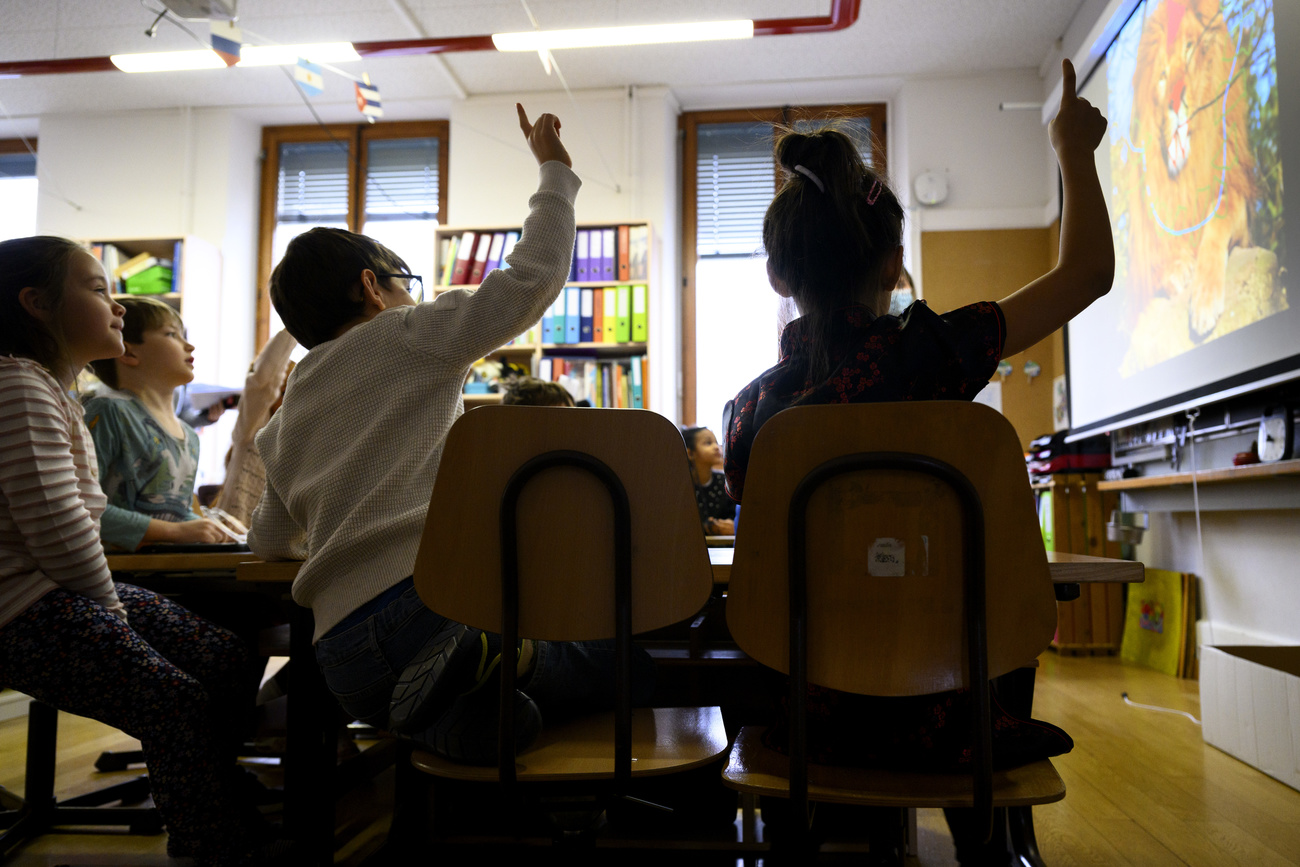
The challenges of integrating Ukrainian students into Swiss schools

Students from Ukraine have just started a new school semester in Swiss schools. The road to integration can be a bumpy one both for schools and students.
It is summer in Zurich. At the Freies Gymnasium in Zurich (FGZ), a senior high school, six students are busy spending the long break studying German. The classes are intensive, lasting three hours every day. Some are still beginners, others have reached an intermediate level. Here, their mornings are filled with learning the basics of German prepositions, past participles and irregular verbs.
This is the new reality for Anya, Dima, Alona, Sasha, Oliviia and Emiliia who were just strangers to each other prior to the war in Ukraine. But for the past months, they have formed a tight-knit group attending integration classes in preparation for the new school year that started in August. The experience of settling into their new lives in Switzerland and a new schooling system has been challenging at times. “I’m a bit afraid that I will not manage,” says Emiliia D, 14 years old, from Odessa who joined FGZ early April. “It has been hard to attend German biology classes because I did not understand anything.”
Situation is ‘stable’
Switzerland has witnessed an influx in students since the Russian war in Ukraine began in February. There are no official statistics on the number of Ukrainian students in Swiss elementary and secondary schools. The latest data from the government shows that more than 61,000 people have been granted ‘protections status S’ so far. The permit is valid for one year (though it can be extended) and allows Ukrainians and their family members to work and study in Switzerland.
Schools quickly scrambled to accommodate the new students. Some turned to retired colleagues to help out. Others created so-called introductory classes before gradually integrating students into regular classes. Now, with the new school year just starting the situation appears to be easing.

More
Swiss schools prepare for Ukrainian children
“At present, the situation seems stable. The cantons have provided the necessary resources for the integration of the students who arrived this spring,” says Samuel Rohrbach, president of the French-speaking Association of Teachers in Switzerland. “Of course, these resources have to be secured in the long-term and adjusted upwards quickly if necessary.”
Children are generally enrolled as soon as they arrive in Switzerland. Attendance is compulsory for those aged between around four and 16 with all children having the right to education in Switzerland. They may either join a class for foreign speakers or immediately participate in a regular class while receiving intensive language lessons, although this varies from school to school.
Preparing for a new term
At the FGZ, when we meet, principal Christoph Wittmer is busy getting things in order for the new semester. He greets the groups of students who have just returned from their German lesson and hands them a voucher to buy books at the bookstore Orell Füssli.
The schedule for the students is demanding, as Wittmer shows. It includes German, English, French, maths and geography among others. “Within one year, they will have to prove that they have managed to reach the [usual] level of the classes,” he says. After that, it’s decided whether the students can continue in a Swiss high school or repeat the grade.
So far, the students from Ukraine have been attending classes in both German and English. From August, they will be placed in either a monolingual or bilingual stream. “They offered each one of us a student to take us through the day. I was really scared because sometimes I couldn’t understand a single word they were saying,” says Anya L, 15, who arrived in Switzerland on March 3. “My first lesson was geography in English. I was just trying to keep up with the information I was getting.”
>> Watch this video to see how the students are settling in at the school.
Meanwhile in Neuchâtel, Les Cerisiers – a pool of schools from seven villages with over 1,400 students – is accepting 20 Ukrainian students this semester. Director Laurent Schüpbach plans to directly integrate students into classes from grades one to six. Those from grades seven to 11 will have a reception class before transitioning into the regular classes.
He is positive about a smooth integration. “This is thanks to the follow-up of the teachers, the internal support that can be requested – medicine, socio-educational service, management – the contacts with the host families and the link that our Ukrainian teacher of the first reception class can have with the parents,” says Schüpbach.
Shortfalls
The crisis has nonetheless exposed longstanding issues in Switzerland’s schooling system including a shortage of qualified staff and financial support for schools.
“Even without the Ukraine crisis, additional teachers are needed. In order to help foreign-language children, we need additional German lessons and the corresponding teachers,” notes Dagmar Rösler, president of the Swiss Teachers’ Federation.
To assist this period of transition, the FGZ brought in two additional German teachers. Principal Wittmer has so far accepted nine students from Ukraine for the new semester but continues to receive requests from potential students. Nevertheless, he is pursuing discussions with nearby schools to see if they can also accept more students.
“The integration of refugee children is a challenge for the whole school [system] and society,” adds Rösler, who argues there should be more financial aid from the federal government for the cantons and municipalities. “The status S enables a relatively quick integration into school and the labour market. This also requires additional resources and thus financial assistance.”
Schools in Switzerland have resorted to varying measures to provide a welcoming environment. Some are collecting money and material to support the students from Ukraine or introducing a buddy system. The FGZ set up a small library with Ukrainian books and raised peace flags on its campus. Nevertheless, Wittmer acknowledges counselling remains an “important task” and is where more resources are needed in the future.
A fresh start
The students at FGZ are both nervous and excited about the new school year when we meet them, just before the start of the new term. It is the first time they will join the regular classes at the secondary school following a typical schedule.
But the uncertainty of the war still hangs in the air with many hoping to return home. Others have their sights set on finishing school and working in Switzerland if the situation does not improve in Ukraine. “I really want to take the Swiss Matura [end of high school diploma] if it’s possible,” says Alona P from Kiev. “I should work very hard but I think I can do it.”
“With the educational system here, I would like to stay in Switzerland instead of going back to my Ukrainian school,” says Anya L. “But I just really hope I have the chance to go back home to see my friends and hometown again.”
Wittmer is taking the situation in stride but wonders about the future prospects of the students. “This is still the big question for us. Is it more of an intermediary solution for the students or is it somehow now the beginning of a career and university in Switzerland?”
Edited by Virginie Mangin

In compliance with the JTI standards
More: SWI swissinfo.ch certified by the Journalism Trust Initiative




























You can find an overview of ongoing debates with our journalists here . Please join us!
If you want to start a conversation about a topic raised in this article or want to report factual errors, email us at english@swissinfo.ch.